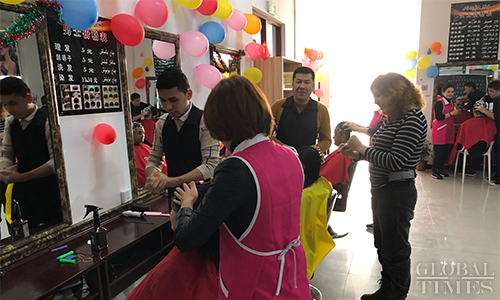HOME >> CHINA
Xinjiang training center graduates eye bright future
By Liu Xin in Aksu and Xie Wenting in Beijing Source:Global Times Published: 2019/8/16 11:32:32

A media group from Indonesia and Malaysia talks to trainees in an education and vocational training center in Hotan, Northwest China's Xinjiang Uyghur Autonomous Region in February. Photo: Liu Xin/GT

Trainees take a hairdressing course at a training center in the Kizilsu Kirgiz Autonomous Prefecture of Northwest China's Xinjiang Uyghur Autonomous Region in February. Photo: Liu Xin/GT
"I knew she was under the deep influence of religious extremism, but I didn't do anything to help her. After graduating from the training center, I heard that she went to jail. I always thought that if I did something earlier to stop her, she would not have ended up in jail," Maiheyali Tuerdi, a graduate of a vocational education and training center in Aksu, Xinjiang said, with tears in her eyes.
Trainees who graduated from vocational education and training centers in Northwest China's Xinjiang Uyghur Autonomous Region expressed hope for the future, and many of them said if the training centers were set up earlier, fewer violent attacks would happen and fewer people would go astray.
China on Friday released a white paper on vocational education and training in Xinjiang, which said that most trainees in the vocational education and training centers in Northwest China's Xinjiang Uyghur Autonomous Region have graduated, secured jobs or started a business.
Shohrat Zakir, deputy secretary of the Xinjiang committee of the Communist Party of China and chairman of the Xinjiang regional government, told a press conference in July that many of the trainees have graduated from the training centers and more than 90 percent of them secured stable jobs and are living a happy life.
For a long time, some Western media and anti-China forces, especially separatists overseas, smeared China's counter-terrorism and de-radicalization efforts in Xinjiang, especially the setting up of the training centers.
However, more and more foreign diplomats and media groups have been invited to visit Xinjiang, talk to graduates and witness the region's economic development. They gave a positive response to China's counter-terrorism and de-radicalization efforts, experts and officials in Xinjiang said, noting that with a better situation in Xinjiang, China is also more open and confident in sharing its counter-terrorism experience.
According to the Friday white paper, foreign diplomatic envoys to China, UN officials, Geneva-based senior diplomats of various countries, as well as more than 40 groups (or delegations) of people from political parties, civil society organizations, news media, and religious organizations of various countries have visited Xinjiang since December 2018. Many of them have written stories about their experiences and recognized the achievements of Xinjiang's de-radicalization work, including the training centers.
The Global Times spoke to three trainees in Aksu Prefecture in southern Xinjiang. They shared their stories about the training centers and expressed their hopes for the future.

A trainee practices her manicure skills and a foreign reporter is willing to be her volunteer at a training center in Kashi, Northwest China’s Xinjiang Uyghur Autonomous Region, in February. Photo: Liu Xin/GT
Hope for future
Maiheyali Tuerdi, 25, went to a training center in Aksu as she "felt influenced by extremism" when studying at Tarim University.
"I was born to a family without any religious background as my father is a civil servant and my mother runs a clothing store. However, my roommates at college come from places where religious extremism has much influence, including Kashi. They organized prayers in the dormitory. They criticized and rejected me for wearing a skirt or clothes showing my shoulders," Maiheyali told the Global Times.
Peer pressure weighed much on her mind and she began to dress as they told her to and to intentionally keep away from "heretics."
"My situation was bad at that time. My parents saw my changes and were worried that it would get worse if nothing was done. I then applied to go to the training center," Maiheyali said.
After studying de-radicalization courses and talking to teachers, she gradually got the mental load off her mind and understood the difference between religion and extremism, she said, noting that she now knows what is legal and what is illegal.
Maiheyali said the thing she regretted most was that she had not persuaded her best friend in college from not going astray further.
"Many of the trainees who I was acquainted with were from rural areas and said they had received little knowledge. Some female trainees said that their husbands used to beat them and they never thought of protecting their rights," Maiheyali said.
After learning about laws, many female trainees told Maiheyali that they wanted to find a job to make money and support their children and grandchildren to further their studies.
Maiheyali has also seen some changes in herself. "I used to be a shy girl and depended too much on my parents. I am now more open and ready to help take care of my mother's shop. The most valuable lessons I learned from the training center are to become an independent modern woman," Maiheyali said, noting that she is preparing for the civil servant exams and planning a trip with her parents to Shanghai.
Mushajiang Maolaayoufu, 34, who graduated from a training center in Aksu Prefecture in 2018, is also full of hope for his family's future.
Mushajiang works at a phone store. Being influenced by religious extremism, he used to organize prayer activities at his store, and treated Muslim and non-Muslim customers differently, which worried his wife Guhaiernisha Aisha and his father.
Mushajiang's family, especially his father, persuaded him not to do this as it violated the law. "My father said my behavior would hurt our family, and I went to the training center," he told the Global Times.
Aside from attending courses on national laws and knowledge about de-radicalization, Mushajiang chose to learn how to make handicrafts. "I repair cell phones, a job that also needs patience and delicate skills, and making handicrafts can help with my skills," he said.
In response to whether his freedom was restricted during his stay in the training center, Mushajiang denied this, saying that there were no violations of his rights.
"I talked to my wife every night via WeChat. I used to ask for leave from the center for half a month since my father was in hospital," he told the Global Times.
His wife said that the training center has changed her husband in a good way. Instead of hanging out late with his friends, Mushajiang now spends more time with her and their daughter. He helps with household chores and has vowed never to hit her anymore.
Talking about the future, the couple remains optimistic. They moved to a new residential community earlier this year close to a school.
"I hope my daughter can be inspired by what she sees in the school every day and that she studies hard. She can also practice standard spoken Chinese when playing with other children in the community," said Mushajiang.
Stable and improved situation
Maiheyali and Mushajiang represent trainees who have graduated from the centers and are now working for a better future for themselves and their families. Ayiguli, another graduate from a center in Aksu, hopes to help more people in her village.
Ayiguli's farmhouse business started in June and can earn at least 3,000 yuan ($426.12) a month. The village helped level the ground for free for her farmhouse and applied for tax exemption for her business.
"The business has improved as more urban residents come to visit our village and I plan to employ more villagers who live in poverty to help me," Ayiguli said.
With the Xinjiang regional government's efforts on counter-terrorism and de-radicalization work, especially setting up the training centers, the security situation in Xinjiang has greatly improved. The Friday white paper noted that no violent attacks have happened in Xinjiang for nearly three years and people of different ethnic groups live in harmony.
The Corban Festival, also known as Eid al-Adha or the feast of the sacrifice, fell on Sunday this year. In a food market in Baicheng county in Aksu on Sunday, the Global Times saw many residents buying vegetables and nuts for the festival. Many lined up in front of butcher shops. Some children happily chased each other.
Many young people go to a bar to enjoy their leisure time at night. Young men and women from different ethnic groups dance and listen to the music of the Uyghur ethnic group.
A staff of a nightclub told the Global Times that their business had been affected when violent and terrorist attacks sometimes happened in southern Xinjiang.
"But now we are enjoying a boom in business. We're open from 9 pm to 4 am," he said.
More open and confident
Tourists from other places in China, foreign diplomats and the media have also witnessed the improved situation in Xinjiang.
According to the Friday white paper, Xinjiang received nearly 76 million tourist trips between January and June 2019.
An official from the publicity department of the Xinjiang regional government, who requested anonymity, told the Global Times that most of the foreign groups he received gave a positive response to Xinjiang's de-radicalization work and some reporters from Middle East countries told him that their own countries should learn from China's experience.
He said that Xinjang's efforts on de-radicalization and counter-terrorism have paid off and society has benefited, which helped the region become more open on the relevant policies to the world.
Tunc Akkoç, chairman of the Aydınlık Newspaper, the oldest newspaper in Turkey, visited Xinjiang in July. He told the Global Times that during his nine-day stay in Xinjiang, what he saw in the training centers impressed him.
He talked to trainees and heard their stories about being influenced by extremism. He learned the truth about the training centers and that no Uyghurs had been oppressed, which had been twisted around by some Western media.
Akkoç told the Global Times that Xinjiang is making a breakthrough and the training centers are an important part of it.
Muhammad Zamir Assadi from Independent News Pakistan, who visited Xinjiang in 2016, told the Global Times that the security situation in Xinjiang has improved a lot.
"We have not heard any news of violence from this beautiful place in recent years. The Chinese government has set an example through different measures and actions, showing that separatists and extremists can be managed with effective policies," he said.
He also noted that the peaceful environment has also attracted domestic and foreign visitors, while the Chinese government is also encouraging foreigners to visit the area and to witness the beauty of Xinjiang where the lives of locals are entering a new era through continuous learning and working.
Posted in: SOCIETY